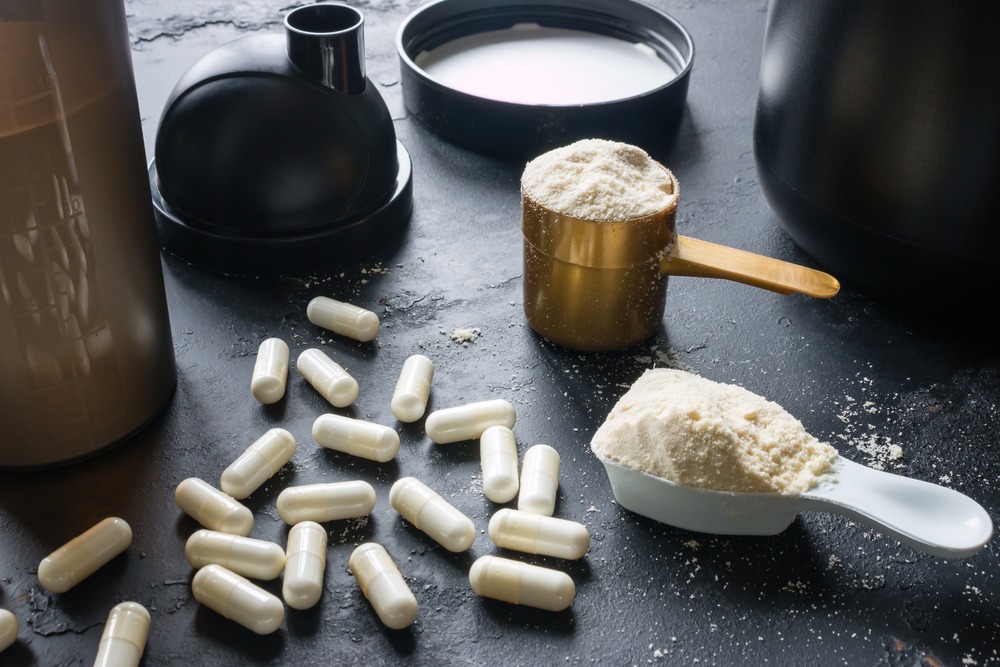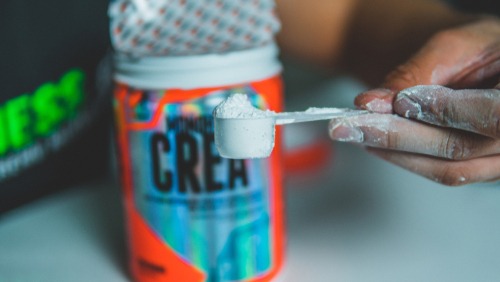Most athletes have heard of creatine, but many also question its status under the anti-doping rules. Is creatine prohibited? Does creatine enhance performance? Athletes can find answers to these questions and more below.
What is creatine?
 Creatine (cree-uh-TEEN) is a molecule stored in muscles that can help create energy. It is made naturally in the body from amino acids, and then a phosphate is added to the creatine molecule to create phosphocreatine. Phosphocreatine is the key component of the body’s “immediate” energy system and provides enough energy for about 10 seconds of high intensity activity. Once the phosphocreatine in the muscles has been used up, the body must switch to a different energy system while more phosphocreatine is formed.
Creatine (cree-uh-TEEN) is a molecule stored in muscles that can help create energy. It is made naturally in the body from amino acids, and then a phosphate is added to the creatine molecule to create phosphocreatine. Phosphocreatine is the key component of the body’s “immediate” energy system and provides enough energy for about 10 seconds of high intensity activity. Once the phosphocreatine in the muscles has been used up, the body must switch to a different energy system while more phosphocreatine is formed.
During repeated high-intensity efforts (such as team sport), the demand for phosphocreatine is greater than the supply, and this limits physical performance. Theoretically, increasing the amount of creatine in your muscles will increase the speed at which phosphocreatine is formed between efforts and improve your overall performance.
Where can I get creatine?
Creatine is produced naturally in the liver, and is also present in many foods, including milk, fish and mollusks, and red and white meat.
Creatine is also available as a supplement and is often used by athletes during a specific period of training. Most supplementation protocols consist of a loading phase lasting approximately one week, followed by a maintenance phase. Some research suggests better uptake when creatine is consumed with protein and/or carbohydrates.
Is creatine performance enhancing?
Consuming creatine, either in foods or supplements, can increase muscle creatine stores. Research has also shown that with the right training, creatine loading can enhance an athlete’s ability to perform tasks that require short bursts of power (less than 30 seconds in duration). However, not all athletes benefit from creatine since the training program itself remains the key component of success.
Is there a medical use for creatine?
Yes, there are some rare conditions of creatine deficiency that may require additional creatine through diet or over-the-counter medications.
Is creatine prohibited?
No, creatine is not prohibited. Although creatine can have a small effect on performance, the effects are not guaranteed and the specific training program remains most influential.
Are creatine supplements safe?
 To date, no long-term health risks have been reported with extended use (up to four years), however, some people report short-term water retention and decreased urinary volume, resulting in bloating and temporary weight gain (2 -5 pounds). In addition, a potentially increased risk of compartment syndrome and muscle cramps has been reported.
To date, no long-term health risks have been reported with extended use (up to four years), however, some people report short-term water retention and decreased urinary volume, resulting in bloating and temporary weight gain (2 -5 pounds). In addition, a potentially increased risk of compartment syndrome and muscle cramps has been reported.
In terms of anti-doping risks, athletes should be careful about using creatine supplements because all supplements come with some level of risk due to the post-market regulatory process, which means that products contaminated with banned substances make it onto store shelves. Before using any dietary supplement, please read more about the risks of using supplements and take note of USADA’s recommendation for third-party certified supplements.
More questions?
For questions about specific products, substances, and methods, contact USADA’s Drug Reference Line at drugreference@USADA.org or call (719) 785-2000, option 2.
References:
Creatine Use in Sports
https://www.ncbi.nlm.nih.gov/pmc/articles/PMC5753968/
Common questions and misconceptions about creatine supplementation: what does the scientific evidence really show?
https://www.ncbi.nlm.nih.gov/pmc/articles/PMC7871530/
IOC consensus statement: dietary supplements and the high-performance athlete
Read more Spirit of Sport blog posts



